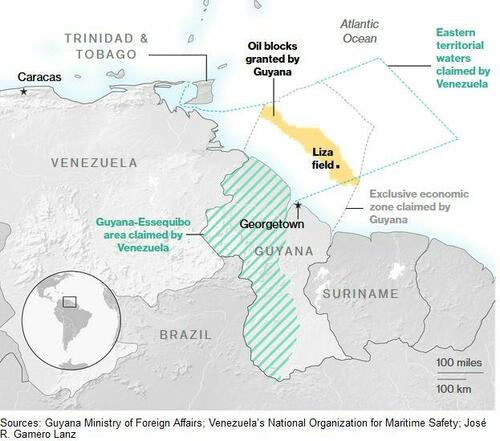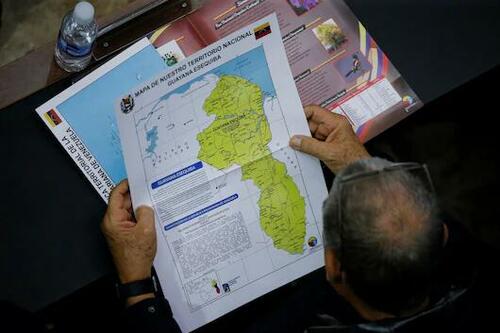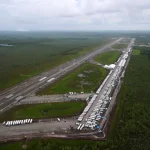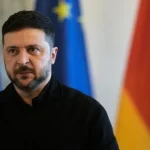
To recap the rapidly evolving situation in Guyana...
-
Neighboring Venezuela now considers around three-quarters of the oil-rich nation theirs - with President Nicolás Maduro presenting a map on television that shows Guyana's Esequibo region as under the jurisdiction of Caracas.
-
Maduro vowed to create a Venezuelan state known as Guyana Esequibo, for which he will grant Venezuelan citizenship to Guyanese residents there.
-
Maduro will has granted licenses and ordered state oil company PDVSA and state metal conglomerate CVG to drill for oil in the area.
-
A special military unit will be created for the territory.
-
Energy companies in the Esequibo region such as Exxon Mobil will "have three months to withdraw."
-
Guyanese President Irfaan Ali said he would report the matter to the UN Security Council, saying in a late-night televised address "The Guyana Defense Force is on high alert," adding "Venezuela has clearly declared itself an outlaw nation."
-
The UN Security Council will hold a closed-door meeting on the issue Friday, Bloomberg reports.
And last night, a Guyana army helicopter was reported missing near the border with Venezuela.
Guyana army helicopter reported missing near border with Venezuela: govt
— zerohedge (@zerohedge) December 7, 2023
Here we go
Now, the US State Department is involved.
"Secretary of State Antony J. Blinken spoke with Guyanese President Dr. Mohamed Irfaan Ali to reaffirm the United States’ unwavering support for Guyana’s sovereignty," said the State Department in a late Wednesday news release.
Department spokesman Matthew Miller also told reporters that the Biden administration supports a peaceful resolution.

As we noted on Friday - why would Maduro do this now, when Caracas has for more than 200 years claimed rights over Esequibo, a vast swath of the territory Guyana Simple: because as we said several days ago, it was only a few months ago that Maduro realized he has leverage over the US president of the "most powerful nation in the world" and get away with anything... even invading a sovereign nation.
Venezuela has long claimed the 61,000-square-mile region. Guyana has repeatedly rejected those claims, saying an 1899 international arbitration resolved the dispute. Venezuela has in turn questioned the validity of that ruling. Just last week, the International Court of Justice urged both sides to refrain from “any action which might aggravate or extend the dispute.” -WaPo
As Austin Bay writes at The Epoch Times, the region has a legacy of overlapping claims.
Spain claimed the Essequibo region was within the borders of Venezuela, but Great Britain and the Netherlands disputed that. Guyana was a British colony. In 1899 an arbitration tribunal in Paris, with the U.S. mediating, ruled that the region belonged to Britain.
Maduro portrays himself as a warrior seeking to right great historical wrongs. Well, playing drama king is easier than fixing a broken economy.
Maduro may be toying with a replay of 1982 when another shaky dictator thought a foreign war to distract his citizens was a dandy idea. The shaky dictator was Argentina’s Gen. Leopoldo Galtieri who proceeded to invade the Falkland Islands (Las Malvinas). He bet seizing the islands from the British “imperialists”—“recovering” them Galtieri called it—would unite Argentinians.
Britain, led by Margaret Thatcher, counterattacked, Argentina lost, and Galtieri’s regime collapsed.
All bark, no bite?
Interestingly, oil is nonplussed by the recent moves. Maybe because Venezuela won't be able to occupy the "new state?"
This is the effective end of this #Venezuela temper tantrum. With even a tiny deployment of US drones and airpower, occupying the "new state" will be impossible for VZ and their decrepit army and air force.
— Volte-Face Investments (@VolteFaceInvest) December 7, 2023
This is why the #oil market is ignoring this. Its just Maduro pulling… https://t.co/CaT1RXeZem pic.twitter.com/PTtB0S2SZ7
As WaPo further notes;
For now, Maduro’s rhetoric remains largely symbolic and political bluster. But his remarks have unsettled Guyana’s leader and attracted stern statements from the United States and Brazil urging Venezuela to refrain from using military force to enforce its territorial claim.
Guyanese President Irfaan Ali said in a CNN interview this week that Maduro’s declaration was a “desperate attempt by Venezuela to seize” his country’s territories. “We are taking every precautionary measure,” he said, including appeals to the United States, Brazil and the United Nations for diplomatic and defense support to deter a Venezuelan invasion. -WaPo
Exxon Mobil CEO Darren Woods was similarly nonplussed. In a Thursday CNBC interview, he suggested that Maduro is going to have a fight on his hands.
"There's concern that Venezuela is going to invade a certain part of the country," said host David Faber.
"I'd put it in the context of what's been happening for many, many years," Woods responded. "It is a matter between nation states... I'm not sure Guyana is standing on its own, to tell you the truth. We've all seen what happens when nations' sovereignties are challenged, and uniliteral action is taken. The world and the outside community is pretty sensitive to that, so my expectation is that there is more broad support in the international community to make sure that the right processes are followed to resolve this dispute."
Neighboring Brazil, meanwhile, has reinforced its northern border in the state of Roraima, adding armored vehicles and more troops, according to Reuters.
To recap the rapidly evolving situation in Guyana…
-
Neighboring Venezuela now considers around three-quarters of the oil-rich nation theirs – with President Nicolás Maduro presenting a map on television that shows Guyana’s Esequibo region as under the jurisdiction of Caracas.
-
Maduro vowed to create a Venezuelan state known as Guyana Esequibo, for which he will grant Venezuelan citizenship to Guyanese residents there.
-
Maduro will has granted licenses and ordered state oil company PDVSA and state metal conglomerate CVG to drill for oil in the area.
-
A special military unit will be created for the territory.
-
Energy companies in the Esequibo region such as Exxon Mobil will “have three months to withdraw.”
-
Guyanese President Irfaan Ali said he would report the matter to the UN Security Council, saying in a late-night televised address “The Guyana Defense Force is on high alert,” adding “Venezuela has clearly declared itself an outlaw nation.”
-
The UN Security Council will hold a closed-door meeting on the issue Friday, Bloomberg reports.
And last night, a Guyana army helicopter was reported missing near the border with Venezuela.
Guyana army helicopter reported missing near border with Venezuela: govt
Here we go
— zerohedge (@zerohedge) December 7, 2023
Now, the US State Department is involved.
“Secretary of State Antony J. Blinken spoke with Guyanese President Dr. Mohamed Irfaan Ali to reaffirm the United States’ unwavering support for Guyana’s sovereignty,” said the State Department in a late Wednesday news release.
Department spokesman Matthew Miller also told reporters that the Biden administration supports a peaceful resolution.

As we noted on Friday – why would Maduro do this now, when Caracas has for more than 200 years claimed rights over Esequibo, a vast swath of the territory Guyana? Simple: because as we said several days ago, it was only a few months ago that Maduro realized he has leverage over the US president of the “most powerful nation in the world” and get away with anything… even invading a sovereign nation.
Venezuela has long claimed the 61,000-square-mile region. Guyana has repeatedly rejected those claims, saying an 1899 international arbitration resolved the dispute. Venezuela has in turn questioned the validity of that ruling. Just last week, the International Court of Justice urged both sides to refrain from “any action which might aggravate or extend the dispute.” –WaPo
As Austin Bay writes at The Epoch Times, the region has a legacy of overlapping claims.
Spain claimed the Essequibo region was within the borders of Venezuela, but Great Britain and the Netherlands disputed that. Guyana was a British colony. In 1899 an arbitration tribunal in Paris, with the U.S. mediating, ruled that the region belonged to Britain.
Maduro portrays himself as a warrior seeking to right great historical wrongs. Well, playing drama king is easier than fixing a broken economy.
Maduro may be toying with a replay of 1982 when another shaky dictator thought a foreign war to distract his citizens was a dandy idea. The shaky dictator was Argentina’s Gen. Leopoldo Galtieri who proceeded to invade the Falkland Islands (Las Malvinas). He bet seizing the islands from the British “imperialists”—“recovering” them Galtieri called it—would unite Argentinians.
Britain, led by Margaret Thatcher, counterattacked, Argentina lost, and Galtieri’s regime collapsed.
All bark, no bite?
Interestingly, oil is nonplussed by the recent moves. Maybe because Venezuela won’t be able to occupy the “new state?”
This is the effective end of this #Venezuela temper tantrum. With even a tiny deployment of US drones and airpower, occupying the “new state” will be impossible for VZ and their decrepit army and air force.
This is why the #oil market is ignoring this. Its just Maduro pulling… https://t.co/CaT1RXeZem pic.twitter.com/PTtB0S2SZ7
— Volte-Face Investments (@VolteFaceInvest) December 7, 2023
As WaPo further notes;
For now, Maduro’s rhetoric remains largely symbolic and political bluster. But his remarks have unsettled Guyana’s leader and attracted stern statements from the United States and Brazil urging Venezuela to refrain from using military force to enforce its territorial claim.
Guyanese President Irfaan Ali said in a CNN interview this week that Maduro’s declaration was a “desperate attempt by Venezuela to seize” his country’s territories. “We are taking every precautionary measure,” he said, including appeals to the United States, Brazil and the United Nations for diplomatic and defense support to deter a Venezuelan invasion. -WaPo
Exxon Mobil CEO Darren Woods was similarly nonplussed. In a Thursday CNBC interview, he suggested that Maduro is going to have a fight on his hands.
“There’s concern that Venezuela is going to invade a certain part of the country,” said host David Faber.
“I’d put it in the context of what’s been happening for many, many years,” Woods responded. “It is a matter between nation states… I’m not sure Guyana is standing on its own, to tell you the truth. We’ve all seen what happens when nations’ sovereignties are challenged, and uniliteral action is taken. The world and the outside community is pretty sensitive to that, so my expectation is that there is more broad support in the international community to make sure that the right processes are followed to resolve this dispute.”
Neighboring Brazil, meanwhile, has reinforced its northern border in the state of Roraima, adding armored vehicles and more troops, according to Reuters.
Loading…





